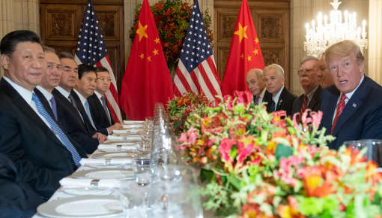- Ameya360 Component Supply Platform >
- Trade news >
- U.S. Pulls Back From Brink of Trade War With China
U.S. Pulls Back From Brink of Trade War With China
U.S. President Donald Trump has suspended a plan to impose tariffs on $150 billion worth of Chinese imports, pulling back from the brink of a trade war that chipmakers and others feared could prove costly on both sides.
U.S. Treasury Secretary Steven Mnuchin told CNBC Monday (May 21) that both the U.S. and China agreed to suspend proposed tariffs as the world's two largest economies work to hammer out a trade deal.
The Trump administration last month unveiled a proposed list of Chinese goods that would have been targeted for 25 percent tariffs as a way to ratchet up the pressure on China to come to bargaining table over a trade deficit that was estimated to be $375 billion last year. The tariffs — which had not yet been imposed — are considered formally suspended.
China — which had vowed to counter any tariffs proposed by the U.S. — responded with a plan to impose tariffs on 128 mostly agricultural products exported by the U.S. to China.
The Chinese government news agency Xinhua quoted a Chinese government official Sunday saying that both sides have agreed to suspend tariffs.
But Mnuchin told CNBC that the tariffs could be put back on the table if no agreement is reached.
U.S. semiconductor executives and others in high-tech were generally wary of the proposed tariffs and the economic impact of a trade war between the two countries. However, many have also pressed for changes in China's rules around lax intellectual property protection, foreign ownership of Chinese businesses and other regulations.
Last week, a representative of the SEMI trade association testified before a U.S. interagency panel weighing trade tariffs against China, calling for a removal of more than 100 products from the tariff list. Jonathan Davis, global vice president of industry advocacy at SEMI, told the panel that an escalation of the trade dispute could result in higher consumer prices, an expanded U.S. trade deficit, and a slowdown in U.S. economic growth.
But Davis — who also voiced support for intellectual property protections — said the tariffs if imposed could ultimately undercut the ability of U.S. chipmakers to sell overseas, stifling innovation and curbing U.S. technological leadership.
"We are happy that both sides have come to the table and agreed to suspend the tariffs," Jamie Girard, senior director of public policy at SEMI, told EE Times Monday.
Girard said the tariff proposals had caused a lot of consternation among SEMI's member companies in both the U.S. and China. He called the suspension of the tariffs a good start for putting together a framework of talks that could lead to constructive negotiations, but cautioned that the "devil will be in the details" as the two sides come together for further discussions on the trade deficit, intellectual property protection and other issues.
Online messageinquiry

China's Xi is about to deliver a speech that could have major consequences for the trade war

US will hold off on raising China tariffs to 25% as Trump and Xi agree to a 90-day trade truce

Expect a photo op and a 'mock deal' at the Trump-Xi meeting — not a long-term truce, says economist
- Week of hot material
- Material in short supply seckilling
| model | brand | Quote |
|---|---|---|
| BD71847AMWV-E2 | ROHM Semiconductor | |
| RB751G-40T2R | ROHM Semiconductor | |
| TL431ACLPR | Texas Instruments | |
| CDZVT2R20B | ROHM Semiconductor | |
| MC33074DR2G | onsemi |
| model | brand | To snap up |
|---|---|---|
| BP3621 | ROHM Semiconductor | |
| ESR03EZPJ151 | ROHM Semiconductor | |
| BU33JA2MNVX-CTL | ROHM Semiconductor | |
| TPS63050YFFR | Texas Instruments | |
| STM32F429IGT6 | STMicroelectronics | |
| IPZ40N04S5L4R8ATMA1 | Infineon Technologies |
- Week of ranking
- Month ranking
Qr code of ameya360 official account
Identify TWO-DIMENSIONAL code, you can pay attention to


Please enter the verification code in the image below:






















